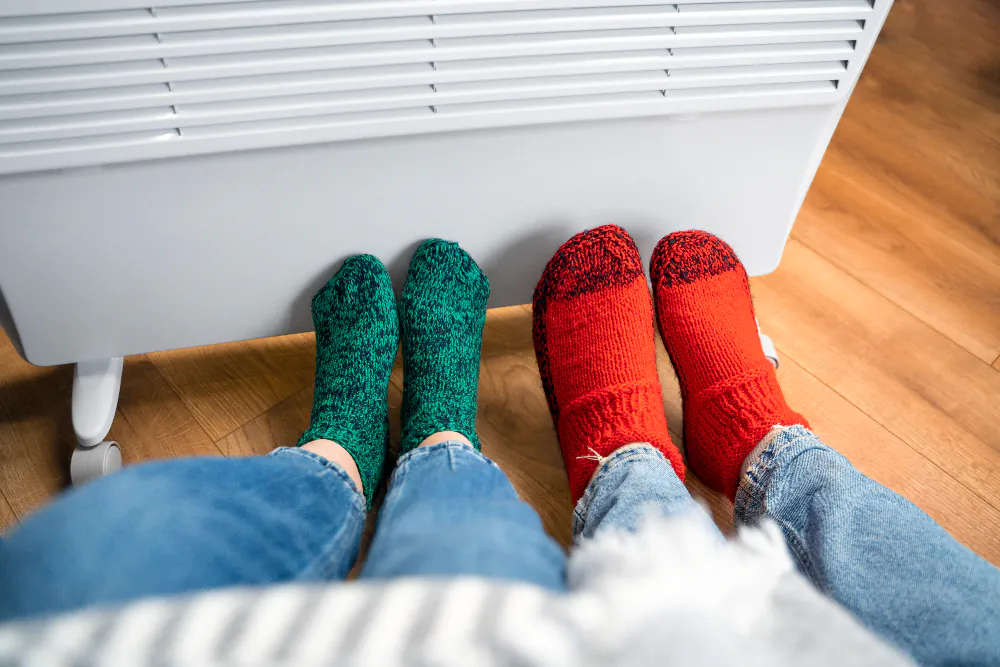Your heating system is one of the unsung heroes of your home. It works tirelessly to keep you warm and comfortable, especially when the weather outside takes a chilly turn. But did you know that the weather can significantly impact how well your heating system performs? Understanding this relationship can help you care for your system and keep your home cozy without breaking the bank. Let’s dive into how weather affects your heating system and what you can do to keep it running smoothly.
Cold Weather Challenges
Your System Works Overtime
When temperatures plummet, your heating system has to work extra hard to keep your home warm. This increased demand can lead to higher energy bills and more wear and tear on your system. If your heating system isn’t in top shape, it may struggle to keep up, leaving you shivering just when you need it most.
Frozen Pipes and Parts
Cold weather doesn’t just make you uncomfortable—it can freeze the components of your heating system too. Pipes that carry water in systems like boilers or heat pumps can freeze, blocking the flow and causing potential damage if they burst. Outdoor parts of heat pumps can also accumulate ice, making it harder for them to do their job.
Safety Concerns
If you have a gas furnace, extremely cold weather can lead to blocked vents from snow or ice. This can trap dangerous gases like carbon monoxide inside your home. Keeping vents clear and unobstructed is not just about efficiency—it’s about safety.
See Also Comparing Different Types of Heating Systems: A Comprehensive Guide
What About Warm Weather?
While your heating system might take a backseat during the warmer months, that doesn’t mean it’s entirely off the hook. Here’s what can happen:
Sitting Idle
During spring and summer, your heating system may sit unused for months. Dust, dirt, and debris can build up, and small problems left over from winter can become bigger headaches when the system is restarted in the fall.
Rust and Corrosion
Humidity tends to rise during warm weather, and all that moisture can cause parts of your heating system to rust or corrode—especially if it’s in a damp basement or near water sources. This kind of damage can reduce the system’s lifespan and efficiency.
Out of Sight, Out of Mind
When you’re enjoying the sunshine and thinking more about cooling off than warming up, it’s easy to forget about your heating system. Skipping maintenance during this time can lead to surprises when the weather turns cold again.
See Also How to Choose the Right Heating Repair Service
Weather’s Whiplash: Fluctuating Conditions
Temperature Swings
In areas where the weather can’t seem to make up its mind, your heating system may be working overtime, cycling on and off frequently. This constant start-and-stop action can wear out components faster and drive up your energy costs.
Humidity Matters
Winter’s dry air can sap moisture from seals and other parts of your system, leading to cracks and leaks. Meanwhile, summer’s high humidity can encourage rust and even mold growth in your ducts.
Extreme Weather Events
Storms and Outages
Winter storms can knock out power, leaving electric heating systems useless. Even gas-powered systems often rely on electricity for parts like fans and thermostats. Having a backup plan, like a generator, can keep you warm when the lights go out.
Snow and Ice Build-Up
Heavy snow and ice can damage outdoor units or block vents, making your system work harder or even causing it to shut down. Regularly clearing away snow and ice can prevent these issues and keep everything running smoothly.
How to Protect Your Heating System
Schedule Regular Check-Ups
Think of your heating system like a car—it needs regular tune-ups to stay in top shape. A professional technician can clean and inspect your system, catching small problems before they turn into expensive repairs.
Seal Up Your Home
A well-insulated home keeps the heat in and the cold out. Weatherstripping, insulation, and sealing up drafts can reduce the strain on your heating system and save you money on energy bills.
Upgrade Your Thermostat
A programmable or smart thermostat can help you save energy by adjusting the temperature when you’re not home or asleep. This reduces wear and tear on your heating system while keeping your home comfortable.
Keep It Clean
Blocked vents and dirty filters make your heating system work harder than it needs to. Regularly replacing filters and ensuring vents are clear can improve efficiency and air quality.
Protect Outdoor Units
If you have a heat pump or other outdoor components, consider using a cover to shield them from snow and ice. Just make sure it doesn’t block airflow, as that can cause more harm than good.
When to Call the Pros
Even with the best care, heating systems can run into trouble—especially during extreme weather. A professional heating repair service can quickly diagnose and fix problems, so you’re not left in the cold.
Wrapping It Up
Weather has a big impact on how your heating system performs, from the freezing demands of winter to the humid challenges of summer. Taking steps to protect and maintain your system can keep it running efficiently and extend its lifespan.
If you live in Spring, TX, and need help with your heating system, KAC Express is here for you. Whether it’s routine maintenance, emergency repairs, or expert advice, our team has the expertise to keep your home comfortable year-round. Don’t wait for a breakdown—contact KAC Express today and make sure your heating system is ready for anything Mother Nature throws your way.



0 Comments